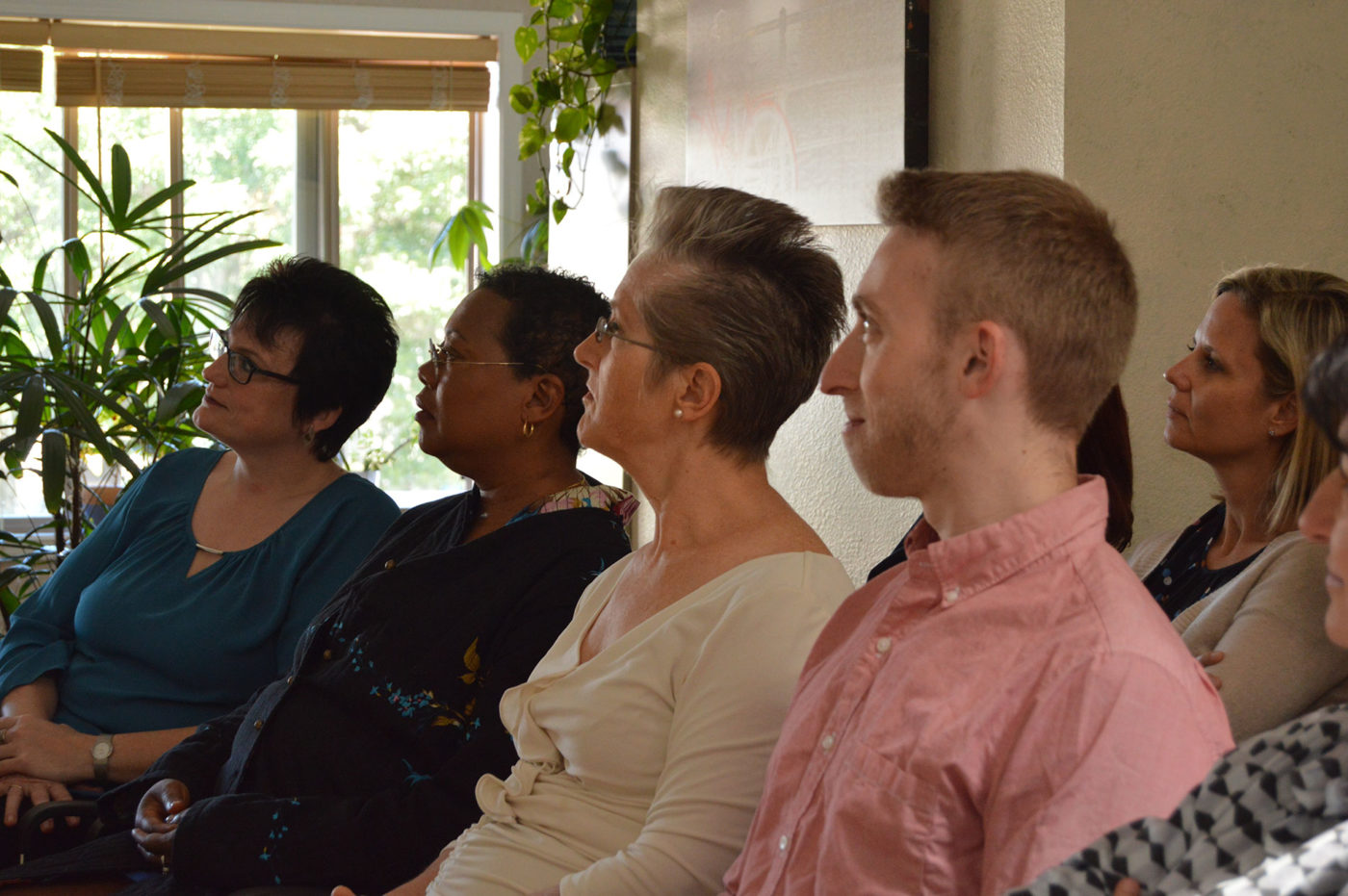Subscribe and receive our best coaching resources
Organizations usually have two options to support employees:
- a long-term investment in executive coaching for a select group
- team coaching and group training classes for everyone else.
In our view, coaching and training in these forms simply no longer cover all areas in which employees can benefit from efficient support to meet the requirements of their position even better.
WE OFFER A STEAMING THIRD OPTION.
In our experience, the new paradigm of Brief Coaching perfectly meets most organizations’ needs for a faster return on investment in coaching.
And that’s because it’s offered exactly when a need arises and creates impactful results in a single or very few coaching sessions.
WHO CAN BENEFIT?
Here are a few examples in which laser-focused Brief Coaching have turned out to be beneficial for employees:
- Optimally preparing for different roles
- Accelerating employees’ transition time
- Handling other current issues, such as desire to
- mentally prepare for peak performance
- handle a conflict
- overcome a setback
- Enhancing employees’ creativity, motivation, and stress-resilience
PROFOUND AND FAST RESULTS IN A SAFE SETTING
To avoid confidentiality issues that often arise in internal coaching, sessions with the LIMBIC COACHING approach can be carried out content and context free.
This is particularly helpful in cases where employees wish to overcome slights, defeats, and setbacks that impede their motivation and work performance.
Contact us for more information on how to introduce Brief and Single Session Coaching in your organization.
HOW WE CAN HELP
We offer different options to match your organization’s situation.
If you have no in-house coaches, we can put you in touch you with a coach certified in LIMBIC COACHING.
If you have a small number of in-house coaches who want to get trained in the LIMBIC COACHING approach, our public certification classes might be the best solution. Information about the training itself can be found on our calendar site.
If you have a larger number of in-house coaches who want to get trained, we offer LIMBIC COACHING training courses on site.
For more information, also check our FAQ.
Frequently Asked Questions
1. How exactly does a BRIEF COACHING session work?
In a unique brief and brain-based way, LIMBIC COACHING addresses a specific issue that the client currently experiences with stress.
As a first step in the coaching, coach and client outline
- what a solution might look like
- what the first signs of improvement will be
- what first step the client can take.
Next, the coach applies a unique combination of muscle response testing and bilateral hemisphere stimulation. The goal is to identify what has kept the client from responding in the desired way up until now and then help them release these stress-triggers systematically.
This unique approach directly addresses the client’s emotional brain, their limbic system, where stress and blocks originate.
After the coaching, clients can consciously re-activate new ways of dealing with challenges. In general, this enhances overall motivation and creativity.
THE LIMBIC COACHING method is very outcome-oriented, and the client does not have to share details about their issue, let alone bare their soul.
Thanks to their efficiency and because they work on the “right floor of the brain”, LIMBIC COACHING engagements show results in as little as 1 to 5 sessions.
This hands-on approach allows for prompt and lasting results without being “touchy-feely”.
2. Is BRIEF COACHING a valuable add-on to coaching in my organization?
Check for yourself if any of these scenarios sound familiar:
- You have high demand for coaching in your organization, but your budget limits long-term engagements to the executive level
- Your in-house coaches have full-time human resource jobs and can only take on a very limited number of coaching clients
- Despite the strong investment in coaching engagements for key executive personnel, results often take a long time to manifest
- Employees in your organization have a specific topic they need support with, such as
- new role
- challenges in the transition
- conflict
- stage fright before an important presentation
- desire to increase resilience to stress
and long-term coaching seems like “overkill” to address the issue.
By providing a way to invest less of your training and development budget while getting faster return on your coaching, LIMBIC COACHING offers an alternative.
In our experience, most coaching topics and issues are well suited to be addressed with this type of Brief Coaching.
3. Can BRIEF COACHING also be combined with long-term coaching engagements?
Though LIMBIC COACHING sessions typically stand on their own, they can also be integrated into longer term coaching engagements as part of the process.
Any coach is familiar with the situation where a client has a great break-through, only to report in the next session that for some reason no progress has been made after all. Usually, this is an indication that unconscious patterns are “running the show”.
It would normally take a lot of work to discover and dissolve what triggers discrepancy between a client’s stated intentions and their actual actions.
LIMBIC COACHING dramatically shortens this process by going directly to the source of the issue: unconscious patterns and involuntary responses that are neither accessible nor changeable through a verbal process.
4. How can BRIEF COACHING be introduced in my organization?
We are happy to introduce you to certified LIMBIC COACHING practitioners who can provide just-in-time support in your organization.
We also offer in-house LIMBIC COACHING certification courses. These training courses are open to participants who have received a minimum of 60 hours of coaching training and preferably already have extensive coaching experience.
5. How can BRIEF COACHING help employees handle stress?

In any profession, stress has a direct effect on productivity and work performance. While a certain level of stress can actually be a motivational factor, stress beyond this threshold tends to influences employee’s communication, collaboration, and overall efficiency.
Most have already experienced that under stress, countless tasks seem much more daunting than they actually are, which influences the quality of the result. In many businesses, this negatively impacts customer satisfaction, which is a high price to pay.

Most employees try to handle stress in the workplace
- through physical exercise
- by temporarily removing themselves from the source of the stress, either physically or mentally.
But employees’ stress triggers are as unique as their fingerprints. So one-size-fits-all approaches can only go so far.
Brief individual LIMBIC COACHING sessions focus on supporting employees in handling their unique work environment in the best possible way.
By detecting and processing whatever causes stress, clients’ individual situations are taken into consideration – and seriously. These custom-tailored interventions allow them to attain sustainable results and truly increase their stress-resilience.
6. How can BRIEF COACHING help airline personnel?
With LIMBIC COACHING, airline pilots and flight attendants can swiftly process stressful situations that have arisen during a flight – challenging situations or conflicts within the team or unpleasant encounters with passengers.
If a staff member feels that a particular episode is still bothering them and influencing their work performance, swift and succinct coaching provides the desired support.
LIMBIC COACHING also helps flight personnel accomplish the desired balance between work and family by providing strategies how to best handle the challenges that come with being away from friends and family and how to best switch gears when coming back from a trip.
The pressure and stress that arises from working when physically tired and from working across different time zones can also be successfully reduced with LIMBIC COACHING sessions.
7. How can BRIEF COACHING help engineers?
Many engineers experience a huge pressure when cooperating and communicating with colleagues in non-technical departments and when faced with demands of instant results and ever tightening deadlines.
Limiting their technical capabilities to match project’s requirements can also be very frustrating. At that, as highly educated professionals, many wish to increase their creativity, stress-resilience and work-life balance.
LIMBIC COACHING can help engineers head-on accomplish this and tackle challenges without explaining their issues in detail.
8. How can BRIEF COACHING help professionals in sales and marketing?
Many professionals in marketing feel constant pressure to perform flawlessly and on highest levels, particularly in negotiations, presentations and communication with other departments. Stress is even increased by constantly trying to do more with less, and to do it faster to meet constantly tightening deadlines.
Professionals in sales have to deal with lots of rejections, refusals, slights, no’s, and irritable customers on a daily basis. Ever increasing sales goals add to the pressure.
At that, most professionals in both marketing and sales wish for a better work-life balance and a higher level of stress-resilience in the face of heavier workloads and longer hours. Single Session Coaching with the LIMBIC COACHING method can help accomplish just that by directly addressing what exactly is triggering stress, developing strategies to handle it successfully and by helping to strategically develop an even thicker skin for professionals in sales.
9. How can BRIEF COACHING help professionals in customer support?
Professionals in customer support have to deal with quite a number of short-tempered and sometimes even insulting customers. This type of work requires employees to have a particular mental and emotional toughness that some customer support employees have a hard time keeping up continuously. Single Session Coaching with the LIMBIC COACHING method can help employees in this field handle rejection and other stress while keeping a positive outlook towards a typically negative and complaining environment.
10. How can BRIEF COACHING help executives?
Their leadership role increases the level of stress most executives experience. Ever increasing workloads and responsibilities, budget cuts, decision making, travel, long and frequent meetings, organizational bureaucracies, interpersonal conflicts and dishonesty, political maneuvering as well as having to deal with others’ leadership and management styles are sources of significant stress.
Physical exercising and boundary maintenance are preferred remedies, but many executives feel the need for additional stress-management skills and strategies for a better work-life balance.
Single Session Coaching with the LIMBIC COACHING approach can help executives handle their individual stress-triggers and increase stress-resilience in a way that does justice to their unique situations, without them having to share details.
11. How can BRIEF COACHING help attorneys?
It is commonly known that the career of a lawyer is not for the faint of heart, but to many the stress, intensity, fast pace and non-stop manner of the work that comes with it gets out of control.
Long hours, the need to deal with increasing pressure, deadlines, setbacks, challenging clients, feeling overwhelmed with constantly thinking in risks and scenarios what could go wrong in a case, handling the competition within a firm or opposing counsel and the stress of becoming partner while often feeling overworked and/or underappreciated and in need to constantly update their knowledge of the law is quite a lot to handle.
In very few individual sessions, LIMBIC COACHING can provide fast and effective support to help attorneys effectively manage their unique stress and increase their overall well-being.
12. How can BRIEF COACHING help doctors and nurses?
It’s not surprising that medical doctors’ and nurses’ jobs are very demanding due to the nature of their work. Many medical doctors and nurses end up experiencing moral distress, burn-out and compassion fatigue. These effects often go beyond the individual level and negatively affect healthcare organizations.
For nurses, physical labor, work hours, shiftwork and increasing workload, suffering and emotional demands of patients and families as well as inter- and intraprofessional conflict and workplace bullying, dealing with difficult patients and sometimes even physical violence take their toll.
For medical doctors, high pressure and responsibility can also be very hard to handle. Having to deal with difficult patients or to give out terrible diagnoses, the constant possibility of making mistakes that can result in harm to patients and having to face accountability for it, and strong emotions of shame around bad cases can easily put doctors to the edge.
In very few individual coaching sessions, LIMBIC COACHING can help nurses and medical doctors define strategies how to deal with the individual stress triggers that deplete their energy, overcome particular episodes, increase their stress-resilience, and make sure they get back in touch with the resources and passion that brought them into the job in the first place.
13. How can BRIEF COACHING help entrepreneurs?
Unusually ambitious with high levels of energy, drive, risk tolerance, and optimism, entrepreneurs can handle a lot. But challenges or disputes with partners, co-founders, board members, investors, suppliers, employees, or government agencies can create high levels of stress.
Entrepreneurs often juggle many roles and face countless setbacks with unavoidable issues such as funding, taxes, technical challenges, staffing problems, difficult or lost customers, or increased competition.
Not knowing how to handle the pressure of work and family simultaneously, which has a bad influence on their relationship, children and overall quality of life and not being able to shut off their racing mind about the constant risk of failure, many experience anxiety and despair and find themselves emotionally overreact to small things.
A single or very few individual LIMBIC COACHING sessions help entrepreneurs handle all these challenges in a way that they can make better use of their time.




